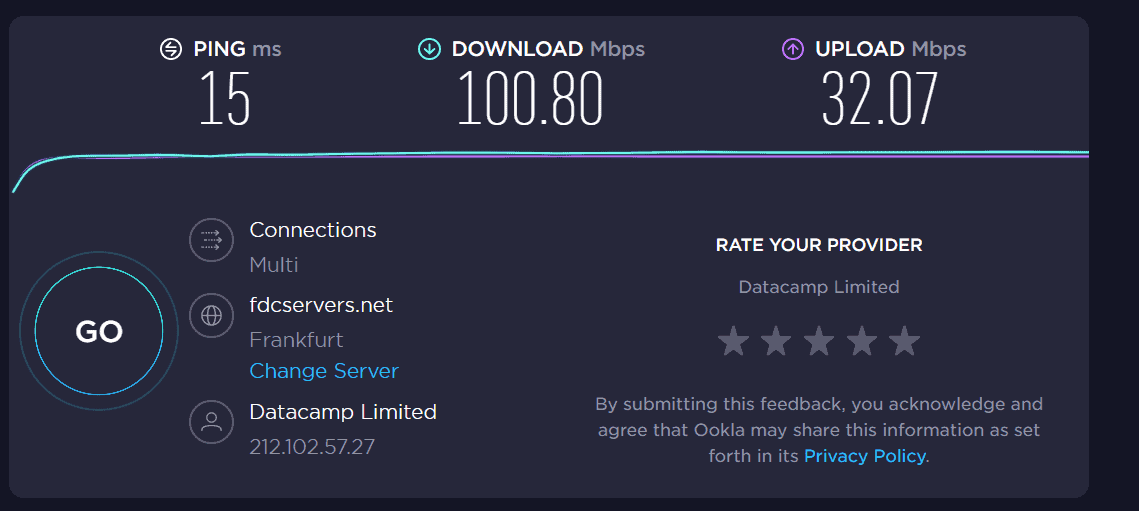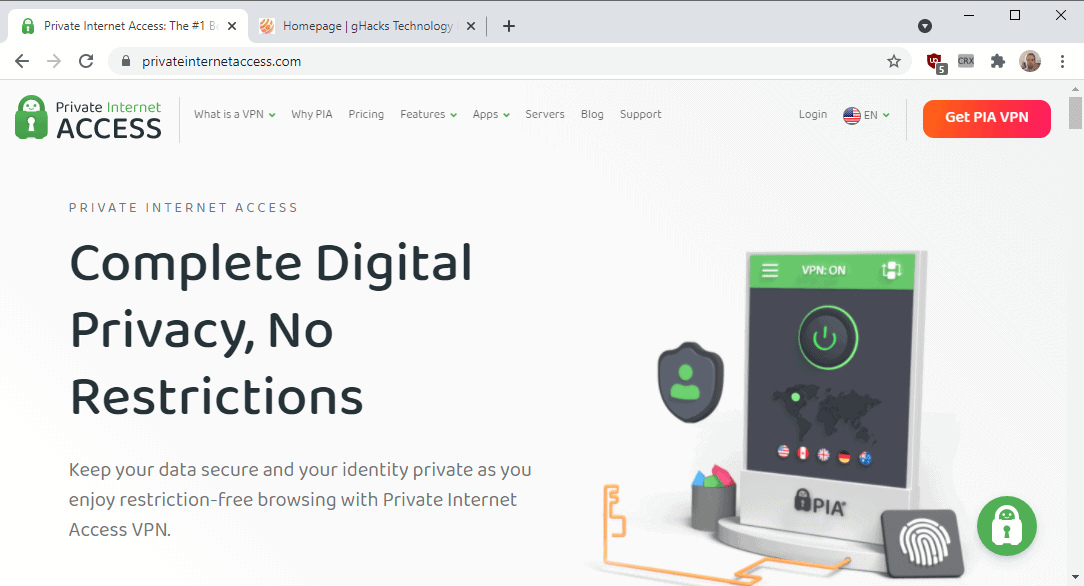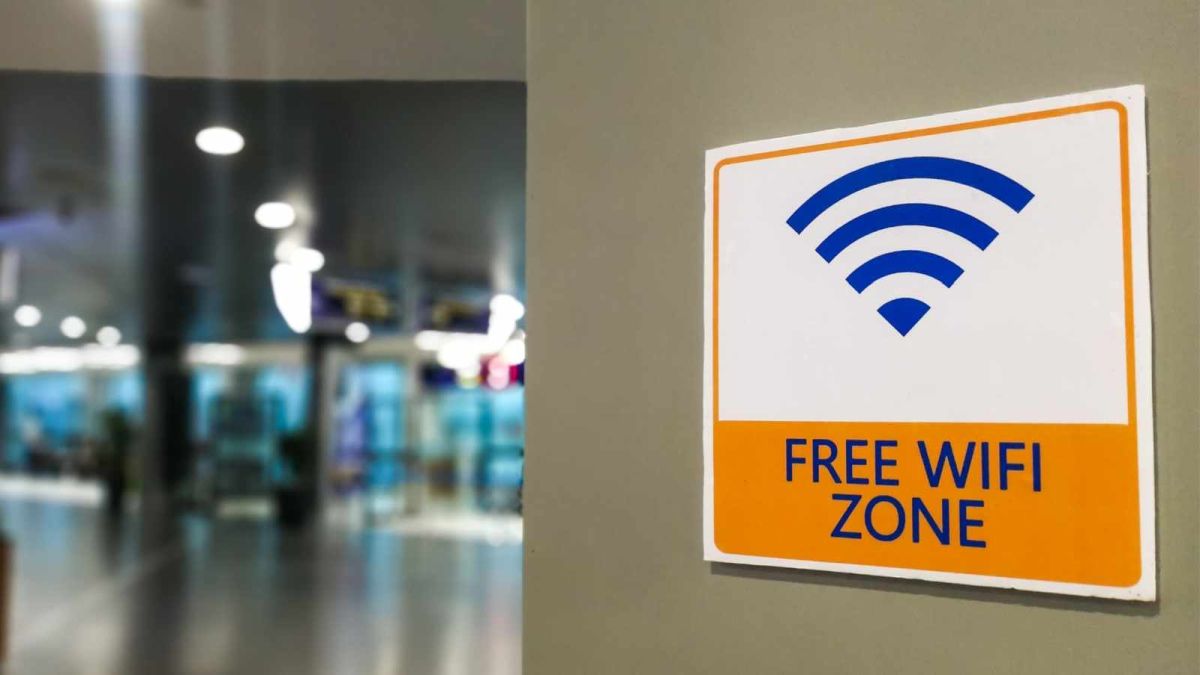Private Internet Access review: fast and affordable VPN with issues

Private Internet Access, short PIA, is a commercial VPN service, established in 2009, with desktop programs for Windows, Mac and Linux devices, mobile apps for Android and iOS, and options to set up the service manually on modems, routers, NAS and other platforms.
Private Internet Access at a glance
- Open-Source VPN client
- Use on up to 10 devices simultaneously
- Servers in 78 countries
- no-logs policy, unverified by third-party audits
- state of the art protocol support
- Supports anonymous payments (gift cards and cryptocurrencies)
- P2P support
- no bandwidth restrictions
- Kill Switch support
- Split-tunneling support
- Servers optimized for streaming
- Browser extensions
- VPN snooze feature
- Only Live Chat and Email support
- Based in the United States
- Parent company has checkered past
Private Internet Access features

Like most commercial VPN services, Private Internet Access gives users different options when it comes to the available plans. All plans support the same feature set, and the only differentiating factor is price and the subscription period.
One month subscriptions are more expensive than 1-year or 3-year subscriptions. In fact, you pay about a third of the price if you subscribe for a period of a year, and about less than a quarter of the monthly price if you subscribe for three years. PIA offers a 30-days money back guarantee on all plans.
PIA customers may pay by credit card, PayPal, or by using cryptocurrencies (Bitpay, Bitcoin, Bitcoin Cash, Ethereum and Litecoin). An option to pay using gift cards is also provided, but not on the default account sign-up page.
Customers may add a dedicated IP address to their subscription for €5 per month; this costs more than the actual plan if paid for a year or three years. Dedicated IP addresses offer advantages, including “faster connection speeds”, getting “off blacklists” and never running into “crowded servers” connection problems according to Private Internet Access. A potential downside is that these dedicated IP addresses may be linked to a particular customer, as they are assigned exclusively.
Private Internet Access customers may install dedicated clients for Windows, Apple Macintosh and Linux devices, use mobile apps for Android or iOS, install browser extensions, or configure the VPN service manually on devices such as routers or modems that support it.
The company has released its code on GitHub to improve trust and transparency. It uses open source protocols, the state of the art WireGuard protocol but also OpenVPN.
Private Internet Access supports P2P traffic, but does not offer P2P optimized servers.
PIA: clients and supported protocols
The client displays all available server locations and ping values in its connection interface. Besides an option to connect automatically, users may select a regional server to connect to it.
The default protocol of the service is OpenVPN, but users may switch to WireGuard. OpenVPN comes with configuration options in the client to increase the strength of encryption from AES-128 to AES-256, and to increase the strength of the authentication and handshake functionality from RSA-2048 to RSA-4096.
Browser extensions are available for Chrome, Firefox and Google Chrome. These complement the VPN and include the following functionality:
- Enable / Disable the VPN connection in the browser.
- Whitelist functionality to connect to sites directly (without using the VPN).
- Block WebRTC to avoid IP leaks.
- Sort gateways by latency.
The ability to bypass the VPN for select connections is useful, e.g. to access regionally blocked content, for Internet banking or shopping activity.
Private Internet Access’ client can be configured to launch on system start and to connect automatically when the application is loaded.
The Windows desktop client supports a snooze feature to disable the VPN for a period of time before enabling it again automatically.
Private Internet Access: servers
Private Internet Access operates streaming optimized servers in select locations, including the UK, US, Japan and Sweden. These servers are optimized for streaming media and unblocking content that is region-restricted. Check out the streaming section to find out how these servers performed in particular, and whether you can use them to unblock streaming content.
The company does not operate other specialized servers, e.g. for P2P, or double-connection servers for increased privacy and security.
Private Internet Access Privacy and security features
Private Internet Access supports a range of security and privacy features. PIA supports the WireGuard protocol, the state of the art protocol that is open source and promising better performance and security. WireGuard was not the default protocol on the Windows test system, but you can switch to it in the Settings under Connection Preferences.
Automation – configure rules to connect or disconnect the VPN connection for specific networks, e.g. to always disconnect the VPN connection when at home, and to always connect when at work.
Change OpenVPN connection parameters – Private Internet Access users may change parameters such as the algorithm used to encrypt data, connection type, remote port, proxy, or configuration method in the options.
DNS – Private Internet Access’ clients use the company’s own DNS service by default. Users may set up a different DNS provider in the settings under Network.
Kill Switch – The Private Internet Access client blocks traffic that is not using the VPN by default. Users may switch to the blocking of all traffic, or turn the feature off. Internet connections of apps that don’t use the VPN are blocked by default.
PIA Mace – A built-in blocker that blocks advertisement, malware and trackers using DNS. Off by default.
Split Tunneling – Split Tunneling may be used to configure apps to bypass the VPN connection, or to always use it.
Configured in the client’s network preferences, PIA users have two options to use split tunneling:
- Allow select applications to connect to the Internet directly, bypassing the VPN.
- Allow select applications to only connect to the Internet through the VPN.
You can use the feature to configure apps such as Netflix or Amazon Prime to always use a VPN connection to access regional content, or to never use the VPN connection for local shopping sites or Internet banking.
Private Internet Access’ Transparency Report lists the number of court orders, subpoenas and warrants it has received. According to the information, it has received 2 court orders, 12 subpoenas and 3 warrants, and did not share any data with the authorities because of its no-logging policy.
Private Internet Access Speed Tests
We ran several tests to determine Private Internet Access’ performance, and compared it to the performance of the direct connection (without VPN).
The PC we used was connected via a 100/40 Mbit connection to the Internet from a location in Germany. We used Speedtest.net for the test, and ran three tests for two different servers to test a local PIA server and a server in the United States.
Without VPN:
- Download Speed: 105 Mbps
- Upload Speed: 33 Mbps
- Ping: 9ms
Regional Server results:
- Download Speed: 100 Mbps
- Upload Speed: 32 Mbps
- Ping: 17ms
United States Server (New York) results:
- Download Speed: 102 Mbps
- Upload Speed: 31 Mbps
- Ping: 96ms
The default connection offered the best values, but the VPN connections were performing well
and not far behind in terms of speed.
Both the regional and the overseas VPN connection offered about the same download and upload speed as the non-VPN connection. Pings were not as good, but that is to be expected, especially for overseas connections.
A quick P2P performance test confirmed the findings. P2P download speed was excellent at the time of running the test.
All in all, excellent speed test results.
Private Internet Access privacy tests
A VPN should not leak the local devices’ IP address, as it would not be all that great for privacy. Good news is that Private Internet Access passed all leak tests that we ran:
DNS Leak Test: passed (https://www.dnsleaktest.com/(
IP Leak Test: passed (https://ipleak.net/)
The company operates its own DNS server, which is used by default.
Private Internet Access: Unblock streaming platforms test
PIA’s ability to unblock regionally locked content, e.g. from Netflix, Disney+, Amazon Prime or Hulu, is limited. The streaming optimized servers were blocked for the most part, and you would get a notification on the streaming providers site that VPN use was detected and that the stream would not be made available because of that.
Depending on the connected region and server, streaming services would sometimes be unlocked, but since you cannot connect to a specific server IP address using the client, it is not the most pleasant experience.
Most PIA servers appear to the blocked by the majority of streaming providers.
We tested Netflix and Amazon Prime particularly. First, by accessing the services from Germany using a German server; this test was not successful as the VPN was detected.
We then tried to access the content in the United States, and these connections were blocked as well.
All in all, if it is streaming that you are interested in, you may want to check out other providers, such as NordVPN or ExpressVPN with its mediastreamer functionality, which offer a better experience.
A look at the PIA Windows desktop app
You interact with the Windows client via its system tray icon. Activate the icon to display the basic interface featuring options to connect to a server, and to check server information. You may expand the selection to display additional information and options, including quick connect options, information about the used protocol, snooze functionality and the subscription.
The client hides itself automatically when you click elsewhere. You may change the behavior, which some may find irritating, by switching the dashboard appearance to “window” in the general settings.
First time users are advised to go take a look at the client’s settings to make sure that everything is configured correctly.
Here is a short overview of important options:
- Switch to the WireGuard protocol, which is open source and may improve the connection’s performance.
- Use a different DNS service.
- Configure automation rules to connect/disconnect automatically.
- Consider enabling PIA Mace, the content blocking component, and changing the VPN Killswitch behavior.
The company behind Private Internet Access
Private Internet Access is based in the United States; this puts it under US jurisdiction and means that it has to comply with all regulations, court orders and laws. The US government may force companies to log customer data legally, and it may issue gag orders that prohibit companies from informing their customers and the public about it.
Kape Technologies acquired Private Internet Access in November 2019 (https://telegra.ph/Private-Internet-Access-VPN-acquired-by-malware-business-founded-by-former-Israeli-spies-12-01) and added the company to its existing portfolio, which includes CyberGhost VPN and Zenmate.
The company was known as Crossrider previously, but changed its name because of past activities. Crossrider has a bad reputation for creating potentially unwanted programs and offers. You can check Malwarebyte's entry on PUP.Optional.Crossrider for one example of such adware.
The company distributed its offers with legitimate software programs to earn revenue. The market dried up when security companies started to flag programs with these offers, Google started to punish sites that distributed these, and browser makers started to block attempts to change search engines, startpages and such.
Crossrider changed its name to Kape Technologies to avoid being linked to past activities when users search for the company name. The official Kape website offers little information and no information on key personal-
Verdict
Is Private Internet Access a good VPN provider? The answer depends on a number of factors. If you look at price, compatibility and speed, then yes, it is a good provider as it delivers excellent results in these departments.
If you dig deeper, you will run into red flags that may be of concern to you. Besides the checkered past of the parent company and the company’s base in the United States, PIA is not as efficient as other VPN services when it comes to the unlocking of geographically locked content.
Servers come and go, and the situation may improve, but as it stands right now, it is not working as well as other services when it comes to that.
Disclaimer
Ghacks strives to be a trusted and unbiased website. In some specific cases, we may earn an affiliate commission or write a sponsored article, but an explicit disclaimer will always tell our readers when an advertiser or an affiliate partner is supporting one of our articles. If no disclaimer, it means that we work with total editorial independence.
























Been with PIA for many years but the last 6 months have been terrible, very slow speeds on the east coast server in Australia, been like that for months and PIA is aware of the problem but have done nothing, when my sub is up I will be going elsewhere.
I have been using PIA for a few years and have been pretty happy with it. I have some issues, but nothing bad enough that to make me start looking for an alternative. It’s easy enough to switch off PIA when I come across a service/website that doesn’t work with it.
1) Disney+ does not work at all when I have PIA turned on. PIA support have told me they do not support Disney+ in Australia. Every other streaming service I have used works well with PIA turned on: Amazon Prime, Netflix, Stan, YouTube.
2) Occasionally I come across a website that doesn’t work properly with PIA. It happens 2 or 3 times a year.
3) Occasionally my connection is really slow when PIA is on. This happens about once a year.
It’s not perfect, by my experience with it has been good overall.
PIA is very slow where I am.
They also require you to disconnect from their VPN to send emails.
I looked into using them a couple of months ago when my NordVPN subscription was ending, and they confirmed the email issue.They will no longer whitelist smtp servers so they said “To resolve the issue you can disconnect from PIA to send your email”
That makes them pretty useless.
I like the disclaimer, well worded.
Streaming out of region is a challenge for any VPN; the best ones put lots of effort into dodging the IP block bullet.
PIA’s history is an ongoing soap opera. It may offer good speeds, webRTC block, etc., but so can a non-tunneled connection. Kape, PIA US based, spys, what’s in store for next week’s episode?
Kape’s incorporated in Isle of Man, trades in London Stock Exchange. They acquired Webselenese this year, an Israeli company that markets through sites they own such as VPN Mentor. Kape’s doing very well financially and expected to do much better with organic feed to their VPN products.
There’s a lot of info on Kape, start here:
https://investors.kape.com/
Then go here:
https://restoreprivacy.com/private-internet-access-kape-crossrider/
My opinion? Trust is No.1 with a VPN. Best approach is guilty until you’re convinced they deserve your trust:
VPN Mentor’s a complete mess.
PIA is in the wrong jurisdiction for consideration as a VPN.
The court cases are red herrings, they don’t prove connections can’t be monitored by gov’t agencies. The non-disclosure thing?
Keep moving, nothing to see here…
“Trust is No.1 with a VPN”
Amen to that. All the rest – speed, features, price, etc, – is secondary. All one needs to know is the history of the parent company which screams… no freaking way!
I used PIA for a while, but had issues with their servers, especially when they moved to their new version of the service. Like most tech support, theirs was useless. So I dumped them and moved to Nord VPN (which was also cheaper).
Running on Linux makes commercial VPNs problematic as most of them either don’t have a GUI Linux client or significant integration except to some degree by supporting openVPN. I use Nord by its terminal client which is simple.
At some point I may start looking into running a self-hosted VPN on a cloud service, which of course will be much more complicated than simply running a commercial VPN.
I’ve also noticed that searching for Kape Technologies online, you’re flooded with results from questionable investment sites hyping Kape’s stock pretty heavily.
Kape has also bought a couple of VPN review sites that rate its own services rather highly, and, I think, some online-scan-software companies. Recently they contracted with cellular provider 3 Hong Kong to integrate PIA into mobile services for several million subscribers in Hong Kong (PRC).